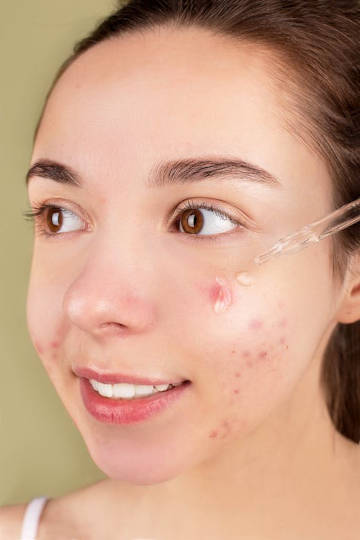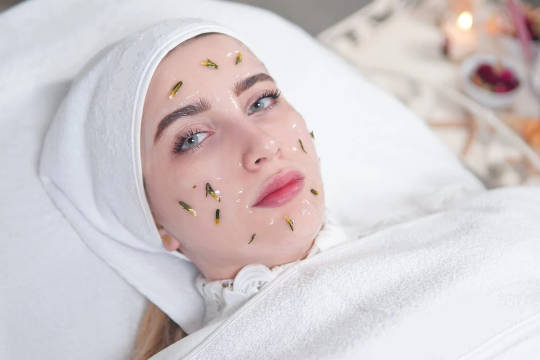How to Deal With Facial Acne
Most people at some point in their lives will need to know how to deal with facial acne or indeed how to treat acne anywhere on the body to regain their once smooth, unblemished skin.
Facial acne is a common skin condition that affects millions of people around the world.
It can be embarrassing and uncomfortable, and it can also lead to low self-esteem.
Fortunately, there are steps you can take to help clear up your acne and prevent it from coming back.
 In this article, I'll discuss the causes of facial acne and outline some practical tips on how to deal with, treat and prevent acne breakouts.
In this article, I'll discuss the causes of facial acne and outline some practical tips on how to deal with, treat and prevent acne breakouts.
By understanding the causes and treatments of facial acne, you can take the steps necessary to keep your skin looking clear and healthy.
Definition of Acne
Acne is a common skin condition that affects many people, especially adolescents.
It is characterized by blackheads, whiteheads, pimples, and in some cases, cysts. Acne can appear on the face, chest, back, shoulders, and upper arms.
It is caused by clogged pores, which can be triggered by hormones, bacteria, and improper skin care. Acne can be mild or severe and it can lead to scarring and low self-esteem.
A proper skin care routine for men and women combined with medical treatment can help to reduce the severity of acne and prevent scarring.
Common Causes of Acne
One of the most common causes of acne is the overproduction of oil, or sebum, from the sebaceous glands.
When the sebaceous glands produce too much sebum, the oil can mix with dead skin cells and clog the pores. This can cause bacteria to become trapped and form pimples, whiteheads, blackheads, or cysts.
Other common causes of facial acne include hormones, genetics, stress, medications, and lifestyle choices such as smoking and using oily or greasy cosmetics. Hormonal changes, such as those that occur during puberty or pregnancy, can cause an increase in oil production, leading to an increase in acne.
Stress can also cause an increase in the production of hormones, leading to the development of facial acne. Finally, certain medications such as corticosteroids or anabolic steroids can also increase the risk of developing acne.
Ways to Prevent Acne
When it comes to preventing acne there are a few key steps that can help reduce your chances of developing breakouts.
Firstly, it is important as part of a daily facial skincare regimen to keep your skin clean and free from any dirt and debris that can clog the pores and cause acne. This can be done by using a gentle cleanser and washing your face twice a day.
Additionally, exfoliating your skin on a regular basis can help remove dry, flaky, dead skin cells and prevent them from clogging your pores. It is also important to use non-comedogenic products that are specifically designed to not block your pores.
Make sure to avoid products that are heavily fragranced and contain irritating ingredients such as alcohol or artificial colors.
Finally, make sure you keep your hair off your face to prevent excess oil and dirt from coming into contact with your skin. With the right combination of skin care, you should be able to reduce your risk of developing facial acne.
Establish a Daily Face-Washing Routine
A daily face-washing routine is an essential part of dealing with facial acne.
It should involve washing the face twice a day, morning and night, with a mild cleanser and lukewarm water. It is important to use a cleanser that is specifically designed for the face and free of harsh chemicals, as these can irritate the skin and make acne worse.
After cleansing, it is important to use a gentle moisturizer to keep the skin hydrated and protected. Additionally, use a gentle exfoliant once or twice a week to remove dead skin cells and help unclog pores.
Finally, make sure to always wash your hands before touching your face and avoid scrubbing or picking at any blemishes. Following these steps can help reduce the appearance of facial acne and prevent new breakouts.
Avoid Touching or Picking at Your Face
It is important to avoid touching or picking at your face if you are dealing with facial acne.
This can spread bacteria and dirt from your hands to your face, which can cause more acne or even infection. Additionally, picking at your face can cause inflammation, leading to more redness and pain.
When dealing with facial acne, it is best to use clean hands and never touch your face unless absolutely necessary. Clean your hands and face before and after applying any treatments to avoid spreading bacteria and dirt. If you must touch your face, be sure to wash your hands first.
Eat a Healthy Diet
Eating a healthy diet is essential to prevent or at least greatly reduce the occurrence of facial acne.
Eating foods that are rich in antioxidants, vitamins, minerals and essential fatty acids can help to reduce inflammation, promote skin health and reduce the risk of infection. Fruits, vegetables, whole grains, lean proteins and healthy fats are all important components of a healthy diet.
Eating a variety of these foods can help to maintain a balanced nutritional intake and reduce the risk of acne. Additionally, avoiding processed and sugary foods can help to reduce the risk of facial acne as these foods can aggravate existing acne.
Drinking plenty of water will also help to flush out toxins and nourish the skin. Eating a healthy diet is an important step in managing facial acne and can help to improve the overall health of skin.
Treatments for Acne
 When it comes to treating acne, there are several different options available.
When it comes to treating acne, there are several different options available.
Depending on the severity of your acne, you may need to use a combination of treatments to get the best results. Mild acne can usually be treated with over-the-counter creams and gels containing benzoyl peroxide or salicylic acid, while more stubborn acne may require a prescription-strength medication such as isotretinoin or antibiotics.
In addition, it is important to practice good skincare habits such as washing your face twice a day with a gentle cleanser and exfoliating regularly to help reduce the appearance of acne. It is also important to avoid picking or squeezing your acne, as this can make it worse.
If your acne does not respond to over-the-counter treatments, it is important to see a dermatologist who can recommend more specialized treatments such as chemical peels, laser therapy, or oral medications.
Over-the-Counter Treatments
Over-the-counter (OTC) treatments are medications that can be purchased without a prescription from a doctor.
OTC treatments for facial acne can include creams, gels, and lotions that contain active ingredients such as benzoyl peroxide, salicylic acid, and sulfur. These ingredients work to reduce inflammation and bacteria, as well as help to unclog pores and reduce oiliness.
OTC treatments are generally affordable, and they can be found in most drugstores and grocery stores. However, they may not be suitable for everyone, so it is important to read the label, follow the directions, and talk to a doctor or pharmacist if any questions arise.
Additionally, OTC treatments may take longer to work than prescription medications, so it is important to be patient and consistent with application.
Prescription Treatments
Prescription treatments for acne are often recommended when over-the-counter products are not sufficient at controlling the condition.
Prescription medications for acne can range from topical creams and gels, to oral antibiotics and hormonal medications. Topical creams and gels typically contain ingredients such as benzoyl peroxide, retinoids, or antibiotics, which help reduce the number of bacteria on the skin, reduce inflammation, and help reduce sebum production.
Oral antibiotics can be prescribed to help reduce inflammation and decrease the number of bacteria on the skin. Hormonal medications, such as birth control pills, are typically used for women to help balance hormones, reduce inflammation, and decrease sebum production.
In some cases, a dermatologist may also recommend a combination of these treatments to provide the best results.
Natural Remedies
Natural remedies can be a great way to treat and manage acne.
Many natural ingredients have anti-inflammatory, anti-bacterial and healing properties which can help to reduce the appearance of acne, reduce inflammation and soothe the skin. These include ingredients such as tea tree oil, witch hazel, aloe vera, honey, apple cider vinegar, turmeric, jojoba oil, and coconut oil.
These ingredients can be applied directly to the affected area or mixed together to create a face wash or mask.
It’s important to be aware that natural remedies can still cause irritation to the skin and must be used in moderation. Additionally, it’s important to consult your doctor before starting any natural treatment for acne.
When to See a Doctor
If your acne does not improve after using over-the-counter medicines, it is important to see a doctor.
A doctor can help identify the cause of the acne and suggest more effective treatments. Additionally, a doctor can help diagnose any underlying medical condition that may be causing the acne.
If the acne is severe, a doctor may prescribe stronger medications such as antibiotics or retinoids. A doctor can also help distinguish between acne and other skin conditions such as rosacea, which requires different treatments.
If you have painful cysts or nodules, you should also seek medical advice as these require prompt treatment. Furthermore, a doctor can also recommend lifestyle changes to help improve your skin health such as quitting smoking, avoiding certain foods, and reducing stress.
When Over-the-Counter Treatments Have Failed
When over-the-counter treatments have failed, it may be time to visit a dermatologist.
A dermatologist is a medical doctor who specializes in skin and can help diagnose and treat facial acne. A dermatologist can provide a personalized treatment plan that may include prescription medications, such as topical antibiotics, oral antibiotics, birth control pills, and/or retinoids.
These medications can help reduce inflammation and bacteria, and can help control the production of oil in the skin. For more severe cases, a dermatologist may also recommend laser treatment, chemical peels, or other procedures to reduce the appearance of acne scars.
Additionally, a dermatologist can provide advice on lifestyle changes and skin care habits that can help reduce the risk of future breakouts.
When Your Acne Is Severe
When your acne is severe, it can be quite hard to manage. Severe acne often causes inflamed pimples, cysts, and nodules which can cause a lot of discomfort and embarrassment.
It is important to take the appropriate steps to manage severe acne.
The first step is to see a dermatologist, who can help diagnose the problem and provide a tailored treatment plan. This may include prescription medication, lifestyle changes, and other treatments.
It is important to follow the dermatologist's instructions carefully to ensure the best results. Additionally, you should use gentle, non-comedogenic products on your skin and take steps to reduce stress and other triggers.
Finally, it is important to be patient and consistent in your treatment plan, as it may take some time to see results.
Conclusion
In conclusion, dealing with facial acne can be a difficult and frustrating process.
However, with a combination of the right skincare routine, lifestyle changes, and medical treatments, it is possible to reduce and even eliminate acne. It is important to find the right combination of treatments that works best for your skin type and acne severity.
Additionally, it is important to practice good hygiene, use non-comedogenic skincare products and makeup, and maintain a healthy lifestyle to further reduce the risk of breakouts.
By taking the time to properly care for your skin and make the necessary lifestyle changes, you can keep facial acne under control and enjoy healthy, blemish-free skin.
[BACK TO TOP]
Posted on Thu, Dec 2, 2022 in Skin Care